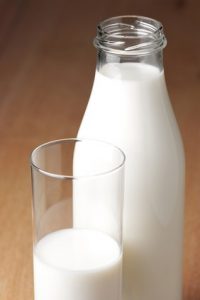Will Eating Cheese Help You Live Longer?
Author: Dr. Stephen Chaney
 A recent study is generating lots of headlines. Here are some examples:
A recent study is generating lots of headlines. Here are some examples:
- Eating Dairy Foods Can Help Reduce Heart Disease Risk.
- Fermented Dairy-Products May Protect Against Heart Attack.
- Full-Fat Dairy May Actually Benefit Heart Health.
- Eating Cheese Might Help You Live Longer.
- Eating Cheese and Butter Every Day Linked To Living Longer.
My favorite headlines were the ones about cheese and longevity. For example, one headline read: “New Study Finds People That Eat Cheese Live Longer.” The article opened by saying “Sprinkle on another handful of mozzarella on your pizza, add an extra slice of American cheese on your burger, or grab a bite of sharp cheddar with your crackers. A new study published in The Lancet claims that eating cheese reduces your risk of stroke and cardiovascular disease. Now that’s something we like to hear.”
A lot of people must like to hear good news about cheese. The headlines about cheese making you live longer outnumbered all the other headlines by about 3 to 1.
In summary, the claims ranged from dairy foods in general to milk & fermented dairy foods, full-fat dairy foods, cheese, and cheese & butter. Let’s look at the study behind the claims to see which of these claims about dairy products and heart disease are true and which are wishful thinking.
How Was The Study Designed?
 The study behind the headlines (M. Dehghan et al. The Lancet, 392: 2288-2297, 2018 ) was a very ambitious study called PURE (Prospective Urban Rural Epidemiology study). It was a large multinational study of 136,384 individuals aged 35-70 from 21 countries in five continents.
The study behind the headlines (M. Dehghan et al. The Lancet, 392: 2288-2297, 2018 ) was a very ambitious study called PURE (Prospective Urban Rural Epidemiology study). It was a large multinational study of 136,384 individuals aged 35-70 from 21 countries in five continents.
At the beginning of the study participants filled out a country-specific food frequency questionnaire. The data from this survey were broken down into total dairy foods, milk, yogurt, cheese, and butter. The data were also subdivided into low-fat and full-fat dairy foods.
The participants were followed for an average of 9.1 years. The outcomes measured at the end of the study were overall mortality, cardiovascular mortality, cardiovascular disease, heart attack, stroke and heart failure. The way these outcomes were measured was also country specific because the way these data are collected varies from country to country. [Note: There were some other outcomes measured, but for the sake of simplicity I have not included them in the discussion. Their omission does not change the discussion.]
Finally, in case you were wondering, this research was not funded by money from the dairy industry.
Dairy Products and Heart Disease Risk?
- Higher intake of total dairy foods (>2 servings/day compared with no intake) was associated with a lower risk of overall mortality (17% less), cardiovascular mortality (23% less), cardiovascular disease (22% less) and stroke (34% less). No association of dairy consumption with heart attack or heart failure was seen.
- Higher intake of milk (>1 serving per day compared with <0.5 servings/day) was associated with a lower risk cardiovascular disease (18% less).
- Higher intake of yogurt (>1 serving/day compared with <0.5 servings/day) was associated with a lower risk of overall mortality (17% less) and cardiovascular disease (10% less).
- No significant effect of cheese was observed for any of the outcomes measured.
- Butter intake was low and was not associated with any of the outcomes measured.
The authors concluded: “We observed that higher dairy consumption was associated with lower risks of mortality and cardiovascular disease, particularly stroke. Our study suggests that consumption of dairy products should not be discouraged and perhaps should even be encouraged in low-income and middle-income countries where dairy consumption is less.”
Will Eating Cheese Help You Live Longer?
 The claims you have been seeing about consumption of dairy foods in general, milk, and yoghurt reducing heart attack risk are supported by this study and several other recent studies.
The claims you have been seeing about consumption of dairy foods in general, milk, and yoghurt reducing heart attack risk are supported by this study and several other recent studies.- I hate to disappoint you, but the claims about cheese and butter consumption reducing cardiovascular disease and extending lifespan are clearly wishful thinking. They are not supported by this study.
The discussion of full-fat versus low-fat dairy products is more complicated. You are undoubtedly aware that most current dietary guidelines recommend avoiding full-fat dairy foods in favor of low-fat alternatives. Studies like this have led some to question whether these dietary guidelines should be changed.
Interestingly, the authors of the PURE study did not make any claims about the benefits of full-fat dairy foods in their discussion of the results. These claims have all come from internet blogs and articles. Why were the authors of the study reluctant to make that claim? To answer that question I turned to reviews of the study published in the Science Media Center by experts in that field of study. Here were some of their comments:
- Because dietary guidelines recommending the consumption of low-fat dairy foods exist primarily in western countries (specifically, the US, Canada & Europe) the distribution of low-fat dairy and full-fat dairy was not evenly divided between counties. Most of the low-fat dairy consumption occurred in western countries. In contrast, most of the full-fat dairy consumption occurred in developing countries. That introduces a couple of confounding variables that are unique to this study. For example:
- In developing countries, diets are often primarily plant-based and tend to be low in sugar and highly processed foods, while in western countries, diets are often primarily meat-based and are high in sugar and highly processed foods. The addition of full-fat dairy to a plant-based diet may not have the same effect as adding it to a pizza or hamburger.
- In developing countries, people with higher incomes, a healthier lifestyle, and better access to health care are often the ones who consume more dairy products. In other words, the PURE study can’t tell us whether consumption of full-fat dairy lead to better health outcomes in those countries or whether wealthier and healthier people in those countries had the means to consume more dairy.
- In many developing countries, a large segment of the population is lactose intolerant. Increased full-fat dairy consumption by these people would be largely yogurt and other fermented dairy foods which have health benefits of their own.
In short, confounding variables unique to this study make it difficult to say with confidence that full-fat dairy foods were just as beneficial as low-fat dairy foods.
In western countries the results of previous studies are mixed. Some suggest that full-fat dairy foods are just as effective as low-fat dairy foods at reducing heart disease risk. Others report that the primary heart-health benefits come from low-fat dairy foods.
Dairy Products and Heart Disease: Diet Context Matters
 Why so much confusion? Some recent studies suggest that diet context matters. Simply put, that means the effect of the overall diet is more important than single food groups (dairy). To illustrate this point, let’s look at two other studies.
Why so much confusion? Some recent studies suggest that diet context matters. Simply put, that means the effect of the overall diet is more important than single food groups (dairy). To illustrate this point, let’s look at two other studies.
The first study (M Chen et al, The American Journal of Clinical Nutrition 104: 1209-1217, 2016 ) was published two years ago by investigators at the Harvard Chan School of Public Health. That study included data from 43,000 men in the Health Professionals Follow-Up Study, 87,000 women in the Nurses’ Health Study, and 90,000 women in the Nurses’ Healthy Study II. All these study participants were from the United States. This study put dairy fat consumption into the context of the overall diet. The main findings were:
- Full-fat dairy foods did not increase heart disease risk compared to a diet that contains high amounts of refined carbohydrates and sugar (the typical American diet).
- However, when dairy fat was replaced with the same number of calories from:
- vegetable fat, the risk of heart disease decreased by 10%.
- polyunsaturated fat, the risk of heart disease decreased by 24%.
- healthy carbohydrates (fruits, vegetables, and whole grains), the risk of heart disease decreased by 28%.
In other words, the effect of dairy fat on heart disease depends on the overall diet. If you add dairy fat to an already bad, heart-unhealthy diet, it does not further increase heart disease risk. (This finding may explain why several recent studies of western populations have found no difference between full-fat and low-fat dairy consumption.) However, this study also shows that addition of full-fat dairy to a heart-healthy diet is likely to increase heart disease risk.
The lead author of that study was quoted as saying: “These results suggest that dairy fat is not an optimal type of fat in our diets. Although one can enjoy moderate amounts of full-fat dairy such as cheese, a healthy diet pattern tends to be low in saturated fat. These results strongly support existing recommendations to choose mainly unsaturated fats from vegetable oils, nuts, seeds, avocados, and some oily fish for a heart-healthy diet.”
The second major study is the 7th-Day Adventist study, which I have described in detail in my book “Slaying The Food Myths.” This study showed that a lacto-ovo vegetarian diet was less heart healthy than a vegan diet but is far heart-healthier than the typical American diet.
What Does This Study Mean For You?
 Dairy foods are good for you: Increased consumption of dairy foods, milk, and yogurt are associated with decreased risk of heart disease. As I have said before, we have 5 food groups for a reason. Dairy foods are an essential part of a healthy diet.
Dairy foods are good for you: Increased consumption of dairy foods, milk, and yogurt are associated with decreased risk of heart disease. As I have said before, we have 5 food groups for a reason. Dairy foods are an essential part of a healthy diet.
- If you are lactose-intolerant I have good news for you. Yogurt and other fermented dairy foods are probably even better for you than non-fermented dairy foods.
- If you are avoiding dairy for other reasons, be sure to get your calcium, magnesium, and vitamin D from other sources. There may be other important nutrients in dairy that are heart-healthy, but these are the ones we are sure of.
The jury is still out on full-fat dairy products: It is best to follow current dietary guidelines and consume primarily low-fat dairy products.
If you are a cheese lover, it is probably OK to consume moderate amounts of cheese or other full-fat dairy foods on occasion as part of a heart-healthy, primarily plant-based diet. In short, it is probably better to add a little cheese to a green salad than it is to add it to pizza or a hamburger. It is probably better to pair your cheddar with an apple than with crackers.
Hopefully, this gives you a better understanding of the relationship between dairy products and heart disease.
The Bottom Line
A recent study looked at the consumption of dairy products and heart disease risk, and overall mortality risk in a study with 134,000 participants from 21 countries on five continents. The media response to this study has been overwhelming. Some of the recent headlines are:
- Eating Dairy Foods Can Help Reduce Heart Disease Risk.
- Fermented Dairy-Products May Protect Against Heart Attack.
- Full-Fat Dairy May Actually Benefit Heart Health.
- Eating Cheese Might Help You Live Longer.
- Eating Cheese and Butter Every Day Linked To Living Longer.
The first two claims were supported by the study results. The claims about cheese and butter were wishful thinking. They were not supported by the study results. The claim about full-fat dairy was supported by the data, but the authors of the study did not make that claim because of study limitations.
Another recent study of 220,000 participants in the United States provides a better estimate of the effect of full-fat dairy foods on heart health. The main findings of this study were:
- Full-fat dairy foods did not increase heart disease risk compared to a diet that contains high amounts of refined carbohydrates and sugar (the typical American diet).
- However, when dairy fat was replaced with the same number of calories from:
- vegetable fat, the risk of heart disease decreased by 10%.
- polyunsaturated fat, the risk of heart disease decreased by 24%.
- healthy carbohydrates (fruits, vegetables, and whole grains), the risk of heart disease decreased by 28%.
In other words, the effect of dairy fat on heart disease depends on the overall diet. If you add full-fat dairy to an already bad heart-unhealthy diet, it does not further increase heart disease risk. However, if you add full-fat dairy to a heart-healthy diet, it is likely to increase heart disease risk.
For more details and a thorough discussion of the full-fat versus low-fat controversy read the article above.
These statements have not been evaluated by the Food and Drug Administration. This information is not intended to diagnose, treat, cure or prevent any disease.

